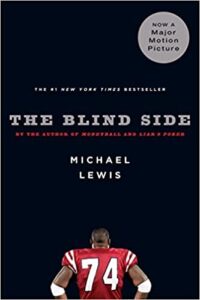Michael Lewis is an American author and financial journalist; he wrote two of the greatest sports novels our generation has seen in Moneyball and The Blindside. Lewis is also known for his work on behavioral finance and forecasting of financial crises. In this episode from 2007, Lewis and EconTalk host Russ Roberts discuss the improbability common in each of his best-selling sports books, with Billy Beane’s innovations and Michael Oher’s rise being more alike than you would think. The podcast is particularly interesting to look back on now with the introduction of NIL in college sports, and the evolution of the use of statistics in baseball.
We hope you’ll share your thoughts with us based on the prompts below. Play ball!
1- Michael Lewis alludes to the tie between “Moneyball” and “The Blindside” as stories of social class. Furthermore, both markets of baseball and football have market inefficiencies in terms of player acquisition which relate to barriers of entry.
What similarities do Scott Hatteberg and Michael Oher share in Lewis’ books? How are market inefficiencies different in football and baseball?
2- Lewis and Roberts discuss the hypocrisy in the façade of education for high-level athletes in college. Athletes from underprivileged circumstances face a barrier to entering the market for college football at the highest level, even when their lack of education should not be a problem considering the lack of education players receive at college.
Is the system still hypocritical? How does the quality of public education affect the potential for high-level athletes to get to college today? How do new NIL laws allowing players to earn money from their name, image, and likeness change the issue?
3- As MLB teams caught on to Billy Beane’s strategy of exploiting a market inefficiency, it was inevitable that further innovations in player evaluation would result. Beane’s focus on on-base-percentage (OBP) has evolved into a focus on on-base-percentage-plus-slugging (OPS) which can be used to measure efficiencies of both hitters and pitchers (OPS against).
With the amount of statistical evaluation prevalent in player evaluation, is the objective quality of analysis taking too much priority over the subjective evaluation of the past? What is the current value of computing statistics versus passing the eye-test of a scout, and how does this problem relate to others we see developing outside of sports?
4- “The Blindside” offers an inspiring yet concerning story of Michael Oher and his rise to both stable living and the NFL. Following Lewis’ thoughts, how many “hidden gems” like Oher slip through the cracks because they do not have someone like the Tuohy’s to pull them out of intensely impoverished circumstances? How can public education be improved to provide an out for kids whose circumstances are hindering their progress and life quality? Are underprivileged kids who do not have athletic gifts suffering from even more barriers to a good life?

5- Lewis and Roberts allude to the questioning done by the NCAA regarding the legality of the Tuohy’s assisting Oher, given that the family had deep ties to Ole Miss and that Michael ended up going there. Even if the Tuohy’s were helping Oher out of pure kindness and concern, other well-off families could exploit talented yet underprivileged athletes to earn money from them or nudge them toward their favorite school.
What flaws are there in the structure of recruiting which continue to breed corruption and violations? How can the NCAA more properly incentivize ethical recruiting while looking out for kids who are vulnerable to having their talents exploited?
6- Lewis and Roberts discuss the possibility of a remedial program for college athletes who are lacking in areas such as reading. How would more transparency in the structure of education for student-athletes affect the landscape of the NCAA? Would big-time student-athletes benefit more from an adjusted curriculum as opposed to an utter lack of educational value? What questions have NIL and compensatory recruiting competition raised in the student-athlete discussion?
Brennan Beausir is a student at Wabash College studying Philosophy, Politics, and Economics and is a 2023 Summer Scholar at Liberty Fund.
























